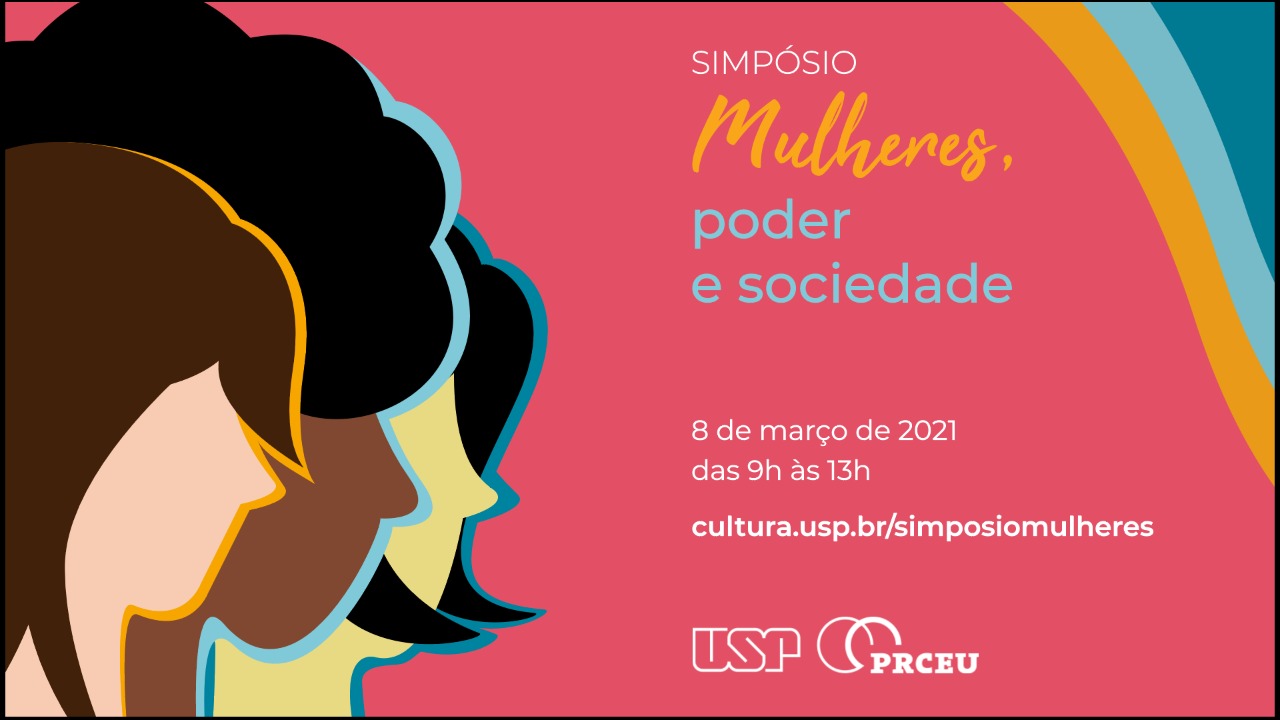Event brought together debaters from various areas who presented their experiences and their professional and life trajectories
By Fabio Rubira
3/9/2021 4:40 p.m.
The International Women’s Day was celebrated and debated at the University of São Paulo last March 8th on several events. Among them, a plural and representative symposium promoted by the Office of the Provost for Culture and Extension (PRCEU). The online discussion, themed “Mulheres, Poder e Sociedade” (Women, Power, and Society), welcomed female contributions in several areas.
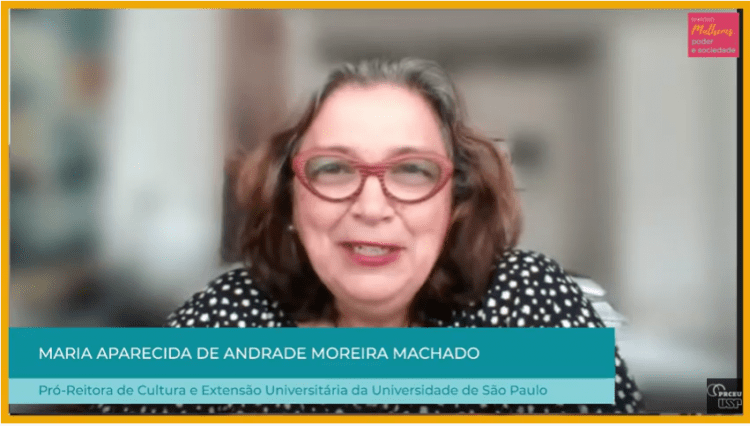 Provost for Culture and Extension at USP, Maria Aparecida de Andrade Moreira Machado, opened the discussion with the statement that “much more is being demanded of women” during the covid-19 pandemic. She highlighted the “conditions, capacity, and the sensitivity that only women have to multitask.”
Provost for Culture and Extension at USP, Maria Aparecida de Andrade Moreira Machado, opened the discussion with the statement that “much more is being demanded of women” during the covid-19 pandemic. She highlighted the “conditions, capacity, and the sensitivity that only women have to multitask.”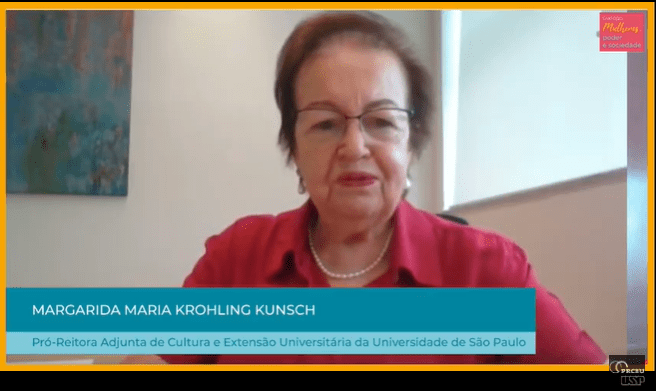
Event coordinator, Vice Provost Margarida Maria Krohling Kunsch pointed out “how much progress is still needed to achieve greater equality of rights and respect in all social, political, and economic spheres”.
When commenting on her northeastern origins during the panel “Women, science, culture, and arts”, scientist Vanderlan Bolzani stated that “we women can, but we will be able to do so much more when there are no barriers in the world”. Professor at the Chemistry Institute of the Universidade Estadual Paulista (Unesp) in Araraquara and president of the São Paulo State Academy of Sciences (Aciesp), she believes that the mission to “dismantle these barriers” is up to “men and women united, building a better world for future generations”.
The geneticist Mayana Zatz, from the Institute of Biosciences at USP, offered a counterpoint by considering that “many women were raised with the idea that women are inferior and were marked by this”. “I confess that I have never felt discriminated against in the scientific environment for being a woman,” she said. “I wonder if, sometimes, it is not the woman herself who is afraid to be daring,” she instigated.
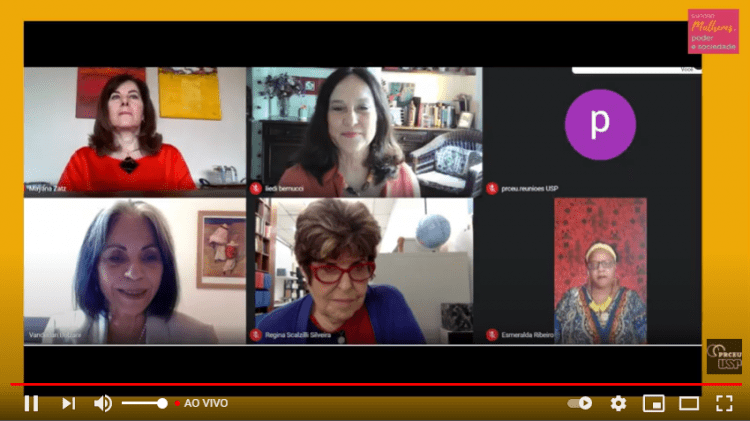
Panel – Women, science, culture, and arts. Above, from left to right: Mayana Zatz and Liede Bernucci. Below, from left to right: Vanderlan Bolzani, Regina Silveira, and Esmeralda Ribeiro.
“I am not claiming it’s our fault. Because we are not to blame. That word is even horrible,” pondered the writer and journalist Esmeralda Ribeiro. The black literature specialist condemned the crimes against women. “It’s like saying that feminicide happens because women allow it,” she said. “We are here with a lot of scientists. But there are still few black women. This is a fact. Where are we? On the margins of poverty.”
A multimedia artist and professor at the Departmento de Artes Plásticas at the School of Communications and Arts at USP, Regina Silveira added that discrimination against the female gender “is historical, cultural, and socially based.”
Opening the panel “Women in politics, social movements and the working world,” São Paulo City Councilwoman Erika Hilton of the Partido Socialismo e Liberdade (Socialism and Freedom Party – PSOL) defended human rights, the black population, and the LGBTQIA+ community. “Our life in society is not an easy life. There are countless battles we fight in our daily lives to get here. But none of that has made us sit in a place of suffering,” she reflected. “It is us, the women, who take the lead of this process of building a new civilizational framework.”
Actress, dance artist, and social entrepreneur Gal Martins added that “being alive is our greatest disobedience. She reflected on what it is like to live “on the margins, in a process of being cast out all the time.”
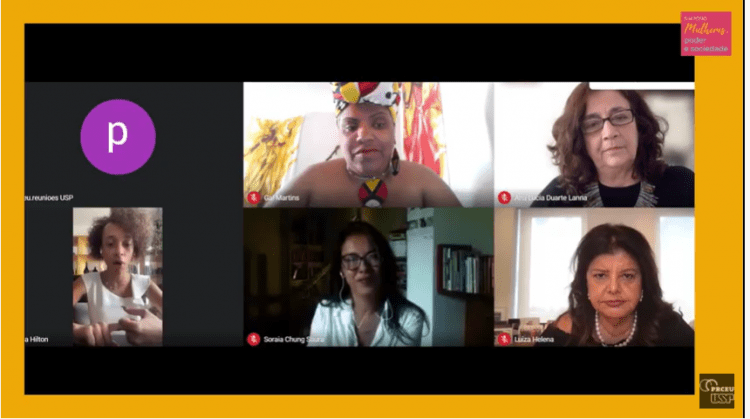
Panel: Women in politics, social movements, and the world of work. Above, from left to right: Gal Martins and Ana Lúcia Duarte Lanna. Below, from left to right: Erika Hilton, Soraya Chung Saura, and Luiza Helena Trajano.
“One of the things I’ve learned is not to feel sorry for myself”, declared Luiza Helena Trajano. The president of the board of Magazine Luiza highlighted the history of being an entrepreneur from a family trajectory with a feminine base. And defended the “woman from the suburbs”, the one who “leaves home at 5 in the morning, comes back at 10 at night and still has to do household chores”.
Professor Soraya Chung Saura, from the Department of Pedagogy of Movement of the Human Body at the School of Physical Education and Sports at USP, remembered the victims of covid-19 in Brazil. “This tragedy that affects us, so often individual, in this case, is, above all, collective. And it affects, in a dramatic way, especially women.” She also discussed “sexual harassment as a reason for exclusion” and stressed the role of the University in combating this crime.
The Symposium “Mulheres, Poder e Sociedade” (Women, Power, and Society) was officially opened by USP Dean Vahan Agopyan, who praised March 8 as “a day to claim the rights from which women are being robbed.” Vice-Dean Antonio Carlos Hernandes added that it is “necessary to advance much more.” The coordinator of the Escritório USP Mulheres (USP Women’s Office), Maria Arminda do Nascimento Arruda, mentioned the “low representation of women in the decision-making structures of the Brazilian State”.
The symposium, moderated by professors Liede Bernucci, director of the Polytechnic School, and Ana Lúcia Duarte Lanna, director of the School of Architecture and Urbanism, was followed live by about 1,300 people and is available in its entirety on the PRCEU channel on Youtube, or below:





